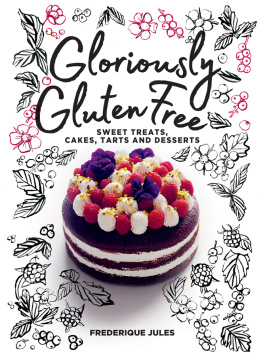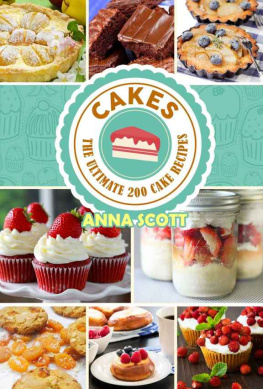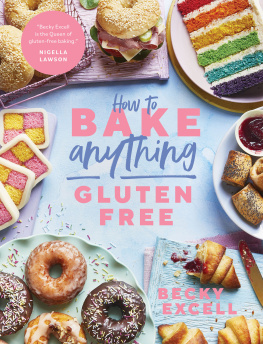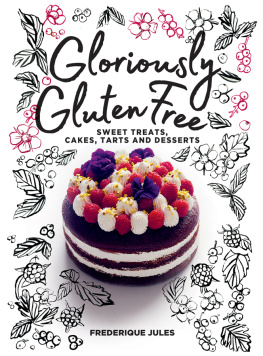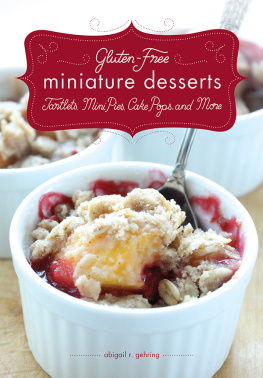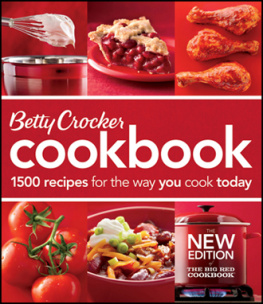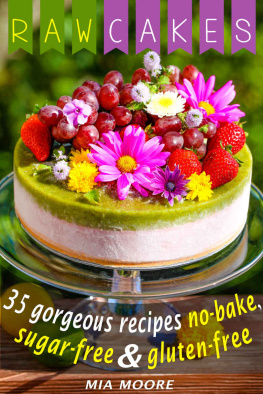Here are 80 recipes for deliciously gluten-free cakes and pastries. There are recipes for the classics, such as chocolate brownies, tarte tatin, madeleines and marble cake; recipes for the timeless, such as cheesecake, lemon tart, strawberry cake and carrot cake; and completely original recipes such as the ultimate gluten-free wedding cake, passionfruit raspberry roll and coconut pineapple cake. There is something for every occasion, from breakfast, midmorning pick-me-up, lunchtime cupcake and elegant dinner dessert generous, extremely indulgent, and guaranteed gluten-free.
INTRODUCTION I am passionate about cooking and foods that bring us pleasure and wellbeing every time we enjoy them.
I have always organised my travels around discovering and sharing food. Cakes, pastries and desserts have always been my favourite, so you can imagine how I felt when I discovered that I was intolerant to gluten and lactose. Adieu to cakes, tarts, choux pastries, crepes, cupcakes, madeleines, cookies and biscuits? How could I continue to share and enjoy celebrations around the table with my family and friends, at restaurants or with my daughters, who have even more of a sweet tooth than me? How could I prepare desserts that would be a source of delight and offer good nutrition? My years in California introduced me to the healthy food, comfort food and wellness food movements, which all sat well with my food intolerances. But I missed the richness and the refinement of French ptisserie. My wildest dream: to bring the grandeur of ptisserie together with the nutritional qualities of Californian cuisine. Thanks to my amazing team of pastry chefs at Noglu over the last five years, we have tested, experimented with and developed many recipes that are easy and healthy, as well as delectable and pretty.
We have brought together the most luscious ones in this book. They are all respectful of the principles that are dear to my heart: using organic products, seasonal fruits, less fat and less sugar. And this goes from breakfast to afternoon tea, from desserts to celebration cakes. Its a modern kind of ptisserie that has adapted to allergies and intolerances, while remaining aware of environmental issues. Recipes that are colourful, delicious and definitely not boring. Whether gluten-free, lactose-free or even vegan, cakes and pastries should still be a pleasure for the eyes and a feast for the palate!
FLOURS To replace wheat flour in our cakes and pastries, we mix together various gluten-free flours.
They are all products of organic farming and often provide much more protein, vitamins and minerals than wheat flour. WHITE RICE Rice flour is particularly digestible, nutritious and high in starch. It is the staple flour used in gluten-free cooking. However, it does give cakes and pastries a very crumbly texture, so it has to be combined with other flours. BROWN RICE Brown rice flour is also a very digestible flour. Its higher in the calcium, potassium and magnesium that are found throughout the bran enveloping the grain.
TAPIOCA This flour, produced from cassava root, binds and thickens mixtures, making them less crumbly. Very high in carbohydrates, it is a good source of energy and also gives a feeling of fullness. POTATO STARCH High in starch, fibre, iron and vitamin B, this flour is a complement to rice flour. CORNFLOUR (CORNSTARCH) Extracted from the starch of the corn grain, cornflour has strong thickening and gelling properties. It is very low in nutrients. BAKING POWDER Organic and certified gluten-free.
CHESTNUT FLOUR This is the most beneficial flour on a nutritional level: it contains proteins, essential amino acids, vitamins B and E, potassium and magnesium, protein and fibre. It is rarely used alone in making pastries and cakes because it gives a very crumbly texture. PSYLLIUM Psyllium is a medicinal plant that adds thickness and softness to mixtures. XANTHAN GUM Thickening and gelling properties. ALMOND MEAL High in protein, good fats and fibre, it can be used to replace some of the flour and fat in a recipe.
SWEETENING AGENTS We use organic products and limit the amount of sweetening agents we use in cakes and pastries, but they are still there for the sweet tooth.
SWEETENING AGENTS We use organic products and limit the amount of sweetening agents we use in cakes and pastries, but they are still there for the sweet tooth.
We prefer sugars with a low glycaemic index, such as coconut sugar, agave syrup or honey. COCONUT SUGAR Made from the sap of coconut flowers, coconut sugar has a very low glycaemic index. It is rich in nutrients (potassium, iron, zinc and copper). COCONUT SYRUP Coconut syrup is a liquid concentrate of coconut sugar. It has a low glycaemic index and is rich in nutrients. AGAVE SYRUP A natural sugar produced from the agave cactus, agave syrup has a very low glycaemic index and a fairly neutral flavour.
HONEY High in antioxidants and potassium, honey has strong and distinctive sweetening properties. WHITE SUGAR Organic and unrefined, white sugar has a high glycaemic index. Use it in small quantities. ICING (CONFECTIONERS) SUGAR Unrefined powdered sugar.

